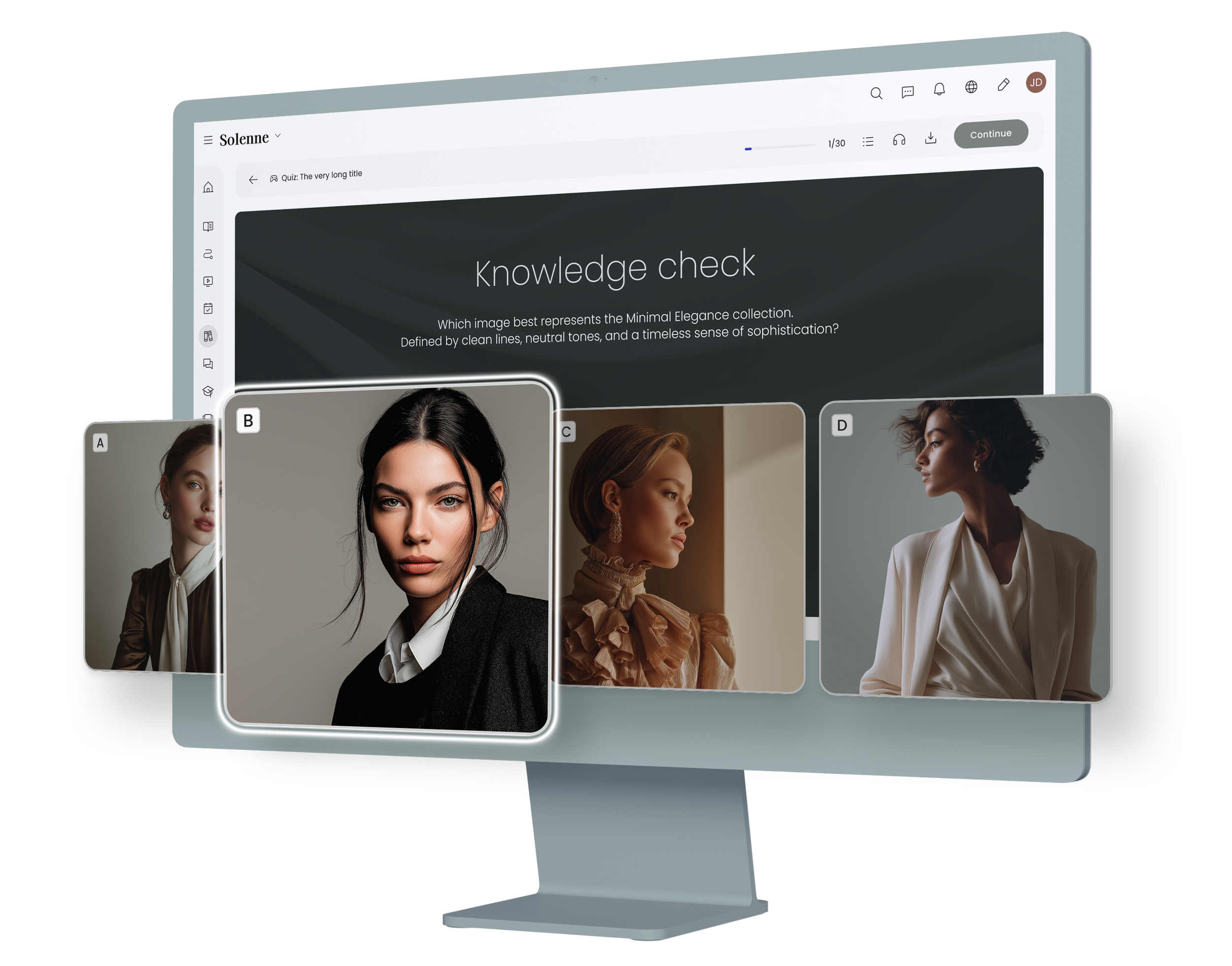Empowering Learners Through Hybrid Intelligence and Adaptive Training Systems
AI Meets Human Intuition: Rethinking Adaptive Training for Modern Learners
In the evolving world of eLearning, adaptive learning succeeds not just through algorithms, but through a thoughtful balance of AI-driven insights and human expertise.
AI analyses learner performance, engagement patterns, and preferences to recommend targeted learning paths.
However, instructional designers and training leaders play a crucial role in shaping how the system learns—adjusting priorities, refining logic, and ensuring that each recommendation aligns with the learning culture and organisational goals.
The outcome is a dynamic LMS ecosystem that blends automation with human understanding, delivering adaptive experiences that feel meaningful, guided, and genuinely personalised.
Why Human Oversight Matters: Preserving the Integrity of Learning Experiences
Every aspect of a learning experience carries weight, from tone and presentation to how ideas are framed.
AI can support training by analyzing data and automating recommendations, but it cannot replace human sensitivity to context, storytelling, and cultural nuances that make learning resonate.
That’s why human oversight is critical: learning designers and managers must curate the way knowledge is shared, creating adaptive learning paths that are not only effective but also meaningful and aligned with organisational identity.
Key Points:
AI streamlines processes and suggests content, but human guidance maintains learning quality and relevance.
Adaptive learning demands nuance, cultural sensitivity, and engagement strategies beyond AI’s capabilities.
Instructional designers shape the narrative, tone, and visual elements of every learning path.
Human oversight ensures consistency across learners, departments, and global contexts.
AI drives personalised experiences, while humans maintain pedagogical intent and meaningful direction.
A hybrid model—AI-enabled, human-guided—is the most effective learning strategy.
AI as a Partner: Prioritising Human Insight in Learning Design
The future of learning design requires more than just algorithms.
AI offers data-driven insights, tracking engagement and suggesting next steps, but it is human expertise that shapes the content, tone, and purpose of every learning experience.
Learning designers and educators guide the narrative, ensuring each interaction is precise, purposeful, and resonates with learners.
Striking the right balance between automation and human judgment is what turns digital training into experiences that are both effective and authentically engaging.
Key Points:
AI analyses performance and engagement to enhance efficiency and personalisation.
Human experts retain final control, ensuring learning remains relevant and purposeful.
Designing impactful training demands empathy, context awareness, and instructional insight.
AI is a tool to support, not replace, human creativity and judgment.
Hybrid systems—combining AI analytics with human storytelling—deliver the most meaningful experiences.
Human-led oversight guarantees alignment, coherence, and emotional resonance across learning programs.
Intelligent Training Design: Steering AI with Human Insight
In adaptive learning, strategy is the key to meaningful impact.
AI can identify trends and suggest personalised pathways, but it is human expertise that sets the vision. Learning leaders and managers pre-define goals, performance indicators, and priorities, guiding how the system operates.
This human-led approach ensures every recommendation, challenge, or pathway is purposeful, consistent, and aligned with organisational objectives. By blending AI-driven analytics with strategic human oversight, training experiences become both efficient and deeply effective.
Key Points:
Managers and instructional designers set learning objectives and performance indicators that guide AI behaviour.
Strategic human oversight ensures training aligns with organisational goals and learning outcomes.
Adaptive learning paths are shaped by custom rules defined by human experts.
AI recommendations remain relevant, meaningful, and pedagogically sound.
Blends data-driven intelligence with human insight and instructional design.
Supports coherent, consistent, and scalable learning experiences across all teams.
Human-Guided Design: Creating Adaptive Learning That Connects
Effective training is a reflection of an organisation’s identity, culture, and priorities.
Human-centred curation is key. Trainers and learning specialists thoughtfully design content, formats, and visuals to drive the right behaviours and communicate organisational intent.
AI can support by recommending content, but human oversight ensures that every learning interaction is meaningful, coherent, and resonates with learners. By blending AI efficiency with human insight, digital learning becomes a deeply impactful experience.
Key Points:
Human-led curation maintains purpose, coherence, and emotional impact in learning experiences.
Learning specialists design content and interactions that reflect organisational principles.
Ensures adaptive learning reinforces desired skills and behaviours.
Combines AI-driven personalisation with human judgment and creativity.
Keeps learning pathways consistent, relevant, and engaging.
Turns digital training into a strategic extension of organisational culture and values.
Dynamic Training Paths: Personalized Learning for Brand Impact
Modern training programs require adaptability that keeps pace with learner needs.
Through The Learning Lab and a robust LMS, dynamic learning paths adjust automatically based on each learner’s progress and feedback. Every adaptation remains guided by the brand’s vision, values, and training goals.
The outcome is an engaging, personalized learning journey, where technology refines the experience in real time and educators maintain alignment, quality, and narrative consistency across the curriculum.
Key Points:
Real-time learning adapts to each learner’s performance and confidence.
Brand alignment and business goals are embedded in every step.
AI precision meets human expertise for flawless delivery.
Training evolves to stay relevant, engaging, and motivating.
Learner experiences reflect the brand’s tone, pace, and priorities.
Personalization and brand integrity converge seamlessly.
The Learning Lab Advantage: Adaptive Paths, Human-Led Quality
The Learning Lab offers a distinctive approach to adaptive learning, where AI-driven personalization aligns seamlessly with brand integrity.
Our hybrid framework enables technology to tailor each learner’s journey while giving brands full oversight of content, tone, and learning structure. Each pathway is intentionally designed to feel coherent, purposeful, and unmistakably on-brand.
By balancing automation with human guidance, training remains both data-informed and deeply connected to the brand’s identity, values, and storytelling.
Key Points:
Our hybrid adaptive approach blends AI personalization with human direction.
Brands retain full control over content, visual identity, and learning flow.
Every course is carefully aligned with the organization’s culture, tone, and standards.
Data intelligence meets design excellence to deliver immersive and engaging learning.
Training experiences are consistent, meaningful, and deeply connected to the brand.
The Learning Lab transforms adaptive learning into a strategic, brand-focused journey.



